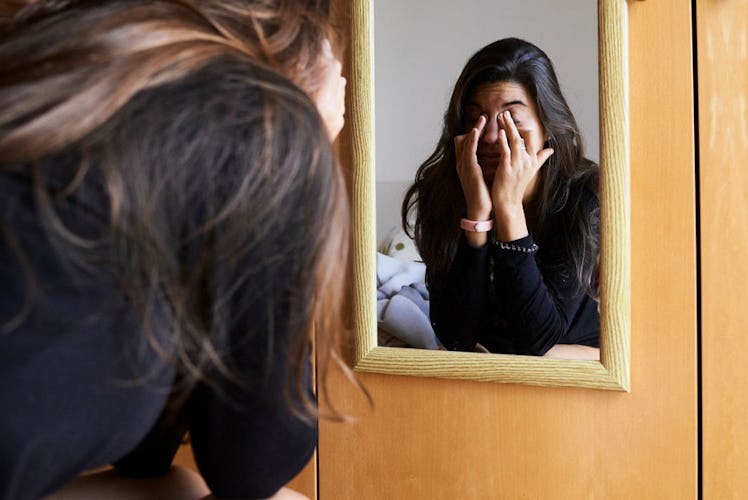
There's A Scientific Reason Why You're In Literal, Physical Pain After A Sleepless Night
Have you ever woken up after a night where you barely slept a wink (if any winks at all), and your body ached almost as badly as if you had the flu? You aren't hungover, you aren't sick, but it's just true: Sleep deprivation can be painful, and according to a new study, there's a legit, scientific reason why your body aches when you haven't gotten enough shut-eye. It's truly not all in your head, even though the reason for it, well, actually is in your head. But, you know — you catch my drift.
As wild as it may sound, after only a single night of inadequate sleep, your brain activity can "ramp up" in certain areas that are specifically associated with sensing pain, according to a ScienceDaily press release. At the same time, the press release explains, brain activity can get "scaled back" in other parts of your noggin that are responsible for how you perceive and respond to things that are painful. In other words, when you're running on little to no sleep, your brain simply doesn't know how to make sense of pain — at least, that's what the results of a new study have shown.
For the study, which has been published in The Journal of Neuroscience, a team of neuroscientists set out to assess the connection between pain and sleep, as they believed (and were eventually able to show in their findings) that the brain literally processes pain differently depending on how much sleep you've gotten.
Per The New York Times, the study included two trials, one of which took place in a sleep lab, while the other was done online. For the IRL trial, the researchers invited a group of 25 young adult volunteers into the lab, allowed them to get a normal, full night of sleep, then measured their brain activity the following morning during a pain-sensitivity task, which simply involved a heating pad being pressed to the subject's ankle, while researchers gradually adjusted the heat to see how much the volunteers could handle. Then, about a week later, the researchers brought the volunteers back into the lab for an overnight stay, but told them to stay awake the whole night. The following morning, The New York Times reports, the researchers administered the same pain-sensitivity task and measured the participants' brain activity once again.
According to the news outlet, the researchers indeed found that a sleepless night "increased everyone’s sensitivity to heat the next morning, by 15 to 30 percent on the pain scale." But the really juicy finding, apparently, was revealed in the brain activity results: Per The New York Times, in each volunteer, brain "activity spiked in pain perception regions, and plunged in regions thought to help manage or reduce pain."
And as for the second, online trial in the study, according to ScienceDaily, the researchers recruited volunteers via the crowdsourcing marketplace Amazon Mechanical Turk to answer questions regarding how they felt about their own sleep quality, and how they believe it relates to their overall well-being and experiences with pain. Yet again, the participants' responses showed that they felt "increased pain during the day after reporting poor sleep the night before."
Febin Melepura, M.D., medical director at the Sports and Pain Institute of New York, tells Elite Daily that, generally speaking, quality sleep is extremely important for a whole host of reasons, and pain management is definitely one of them. "If you have a good night’s sleep, you tend to eat less calories from carbohydrates, your memory is improved, you’re in a better mood, and your body heals injuries it endured from the day before," he explains. "The rejuvenating properties of sleep have been well-established for muscle growth and strength, and in fact, inadequate sleep can decrease muscle mass."
As a pain physician, Dr. Melepura tells me he sees a lot of patients who wake up with more pain than they went to sleep with, who also have trouble staying asleep throughout the night. One way to combat this, he explains, is to try "sleeping on a firm mattress that will support you and give your muscles a chance to relax while you are sleeping, since softer mattresses do not give you the adequate support, so your muscles are constantly contracting throughout the night to compensate." Additionally, he suggests that "doing some routine stretches before bed can do wonders for your aches and pains in the morning."
Bottom line: It's pretty normal if you wake up after a sleepless night in literal, physical pain, but if you find that a firmer mattress and some new, juicy stretches aren't helping you out, it's never a bad idea to check in with your own doctor about what's going on.